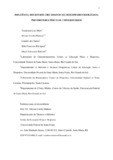| dc.contributor.advisor | Matheus, Silvana Corrêa | |
| dc.creator | Moro, Vanderson Luis | |
| dc.date.accessioned | 2017-05-10T15:50:03Z | |
| dc.date.available | 2017-05-10T15:50:03Z | |
| dc.date.issued | 2009-09-17 | |
| dc.date.submitted | 2009 | |
| dc.identifier.uri | http://repositorio.ufsm.br/handle/1/2847 | |
| dc.description | Artigo (especialização) - Universidade Federal de Santa Maria, Centro de Educação Física e Desporto, Curso de Especialização em Atividade Física, Desempenho Motor e Saúde, RS, 2009. | por |
| dc.description.abstract | The circadian rhythm consists on the cyclic changes that occur in the 24 h period, which
might interfere in the human performance. The purpose of this study was to compare the
results of the physiologic variables, of the reaction time and of the functional variables
obtained in different times of the day. The 30 volunteers (15 men and 15 women) performed a
battery of tests in the morning (10 h), in the afternoon (16h) and at night (20h). The analyzed
variables were the body temperature (oral temperature), the heart rate, the blood pressure
(systolic and diastolic), the reaction time (simple and choice), the flexibility (sit-and-reach),
the agility (shuttle run), the velocity (30 m sprint), the muscle power (medicine ball throw,
long and sargent jump) and muscle strength (dynamometry). The results were submitted to a
variance analysis in a linear mixed model (3 shifts) with Bonferroni corrections for multiple
comparisons, with a 5 % significance level. In the majority of the studied variables there was
no circadian variation. Only the body temperature and the agility for the male group and the
systolic blood pressure and the vertical jump for the female group presented statistically
significant differences. The data suggest that the response of the majority of the studied
variables, inserted in a battery of tests, do not suffer influence of the time of day (10, 16 and 20 h). | eng |
| dc.language | por | por |
| dc.publisher | Universidade Federal de Santa Maria | por |
| dc.rights | Acesso Aberto | por |
| dc.subject | Periodicidade | por |
| dc.subject | Exercício | por |
| dc.subject | Aptidão física | por |
| dc.subject | Homens | por |
| dc.subject | Mulheres | por |
| dc.title | Influência dos ritmos circadianos no desempenho fisiológico, psicomotor e físico de universitários | por |
| dc.type | Trabalho de Conclusão de Curso de Especialização | por |
| dc.degree.local | Santa Maria, RS, Brasil. | por |
| dc.degree.specialization | Atividade Física, Desempenho Motor e Saúde | por |
| dc.description.resumo | O ritmo circadiano consiste nas mudanças cíclicas que ocorrem no período de 24 h, podendo
interferir no desempenho humano. O objetivo do presente estudo foi comparar os resultados
das variáveis fisiológicas, do tempo de reação e das variáveis funcionais obtidas em diferentes
horários do dia. Os 30 universitários voluntários (15 homens e 15 mulheres) realizaram uma
bateria de testes no turno da manhã (10 h), tarde (16 h) e noite (20 h). As variáveis analisadas
foram a temperatura corporal (temperatura oral), a freqüência cardíaca, a pressão arterial
(sistólica e diastólica), o tempo de reação (simples e escolha), a flexibilidade (sentar-ealcançar),
a agilidade (shuttle run), a velocidade (corrida 30 m parado), a potência muscular
(arremesso da medicine ball, impulsão horizontal e vertical) e a força muscular
(dinamometria). Os resultados foram submetidos à análise de variância em um modelo linear
misto (3 turnos) com correções de Bonferroni para comparações múltiplas, utilizando 5%
como nível de significância. Na maioria das variáveis estudadas não foi constatada variação
circadiana. Apenas a temperatura corporal e a agilidade para o grupo masculino e a pressão
arterial sistólica e a impulsão vertical para o grupo feminino apresentaram diferença
estatisticamente significativa. Os dados sugerem que a resposta da maioria das variáveis
estudadas, inseridas em uma bateria de testes, não sofre influência da hora do dia (10, 16 e 20h). | por |
| dc.publisher.unidade | Centro de Educação Física e Desportos | por |


